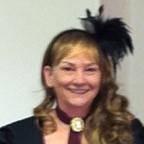
Juliet Kincaid taught writing for thirty-five years, including twenty-five years at Johnson County Community College. Now that she’s retired from teaching, Juliet devotes much of her time to writing and publishing fiction such as January Jinx and Fatal February, historical mysteries set in Kansas City, a place that could get downright deadly a hundred years or so ago. Why does Juliet write? you might ask. Simple answer: It makes her happy. She also enjoys teaching others how to write, especially novels.
Kincaid will teach Novel Basics at our 2016 Writers Conference.
Introduce yourself. Where do you live and work?
My family and I came to Overland Park, KS in 1980, so I could start work at Johnson County Community college as a teacher of writing. Now retired from JCCC after twenty-five years, I work at home as a self-published author.
What kind of writing do you do?
As a writing professor, I wrote every kind of writing that I taught my students how to write. The genres included essays, poetry, plays, scripts, short stories and novels. Currently, I mostly write fiction with occasional blog entries on my website www.julietkincaid.com.
How long have you been writing?
Two answers here: As a high school and college student, I of course wrote lots of papers, but when I was at the Ohio State University in the 70’s, I made a habit of writing papers for my professors and short stories to share with my friends. I also wrote my first novel at OSU as an experiment with my dissertation topic: the novel in journal form. So we can say that I’ve been writing fiction for about forty years. I began writing fiction with an eye to getting my stories and novels published in 1986.
Did you choose your genre, or did it choose you?
For me this is a chicken-or-the-egg sort of question, so let me put it this way. I’ve always loved to read, especially novels. I have a life-list of books I’ve read that I started the summer I was fourteen going on fifteen. The first entry is The Saint on the Spanish Mainby Leslie Charteris. I’ve always preferred reading works of popular fiction like the Saint series because they have lively stories and strong plots with mystery, humor and a spot of romance now and then. So quite naturally, the fiction I write has these elements. I also enjoy reading historical fiction like Lindsey Davis’ mysteries set in Ancient Rome. So I gravitated rather naturally to writing historical mysteries set in Kansas City where I live.
How many unpublished manuscripts are stuffed in your desk drawer (or in a folder on your computer)?
Currently, I have a few short stories and about eight unpublished novels on hand. Of these, I plan on publishing a collection of the stories and at least three of the novels sooner or later. I also have two or three nonfiction books about fiction I’d like to publish when I find the time.
What do you find most challenging or surprising about the writing process?
One of the elements I find both surprising and delightful about writing fiction is having my characters tell me what they want to do.
The publishing process?
The learning curve for publishing was very steep for me and I still find marketing and promoting effectively very challenging.
On what does your writing productivity depend? Is it a routine, a place, a special pen?
When my daughter and I moved into our house in 1984, we furnished the front bedroom as a home office, a decision that still helps me write.
What’s the best piece of writing advice you’ve ever gotten?
I don’t recall from whom I first received the following advice, but it’s very good and I always pass it on to my students: Write every day.
To whom do you look for inspiration?
M. Louisa Locke, self-published author of historical mysteries set in San Francisco, among others.
What books do you recommend to fellow readers and writers?
For fellow readers: The Cuckoo’s Calling by Robert Galbraith (a.k.a. J. K. Rowling)
For fellow writers: The Weekend Novelist by Robert J. Ray
You can find Juliet at www.julietkincaid.com or facebook.com/JulietKincaidauthor2016.
